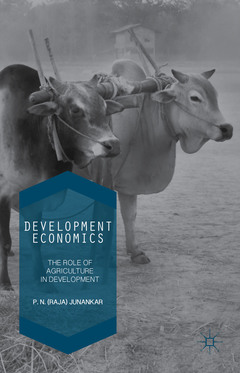Description
Development Economics, 1st ed. 2016
The Role of Agriculture in Development
Coordinator: Junankar P. N. (Raja)
Language: English
Subjects for Development Economics:
233 p. · 14x21.6 cm · Hardback
Description
/li>Contents
/li>Biography
/li>Comment
/li>
The papers in this book study economic development from the perspective of social justice and economic efficiency; exploring the role of land tenure and productivity in Indian agriculture. Junankar discusses the efficiency of small farms versus large farms, and the role of share-cropping tenancy.
2. Land Tenure, Agricultural Productivity, and Taxation
2.1 Land Tenure and Indian Agricultural Productivity
2.2 Land Ceilings as a Tax on Agriculture
2.3 Review of Palanpur: The Economy of an Indian Village
2.4 Agricultural Taxation in Less Developed Countries
3 Poverty, Mobility and Inequality
3.1 Poverty in India
3.2 The Green Revolution and Inequality
3.3 Mobility and Inequality in Indian Agriculture
4 Do Farmers in Developing Countries Maximise Profits?
4.1 Tests of the Profit Maximisation Hypothesis
4.2 Do Indian Farmers Maximize Profits?
4.3 Neoclassical Economics and Indian Agriculture
4.4 The Response of Peasant Farmers to Price Incentives
5 Informal Labour Markets
5.1 The Informal Labour Market in India
6 Microfinance and Women's Empowerment
6.1 Factors influencing women's empowerment on microcredit borrowers
Brings together seminal papers from leading figure in development economics
Proposes ways for farmers to maximise profits
Analyses economic development from a social justice and economic efficiency perspective




